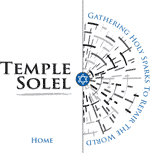The Jewish Outreach Institute, a wonderful organization devoted to enabling Jewish orgs be as welcoming as possible to interfaith families, brands its approach by using the imagery of a 'big tent.' But there's a 'Big Tent Judaism' of a different sort on display in this week's Torah portion (Parshat Terumah). I am speaking, of course, about the parsha's obsession with all things related to the construction of the Tent of Meeting....the portable structure that our ancestors constructed in order to have a place to encounter God during their travels through the wilderness. (Click here for the results of a Google Images search re the Tent of Meeting, though keep in mind that some of these images come from Christian organizations who also find meaning in the Tent, and whose interpretation is potentially different from our own.)
I bring all of this up as background, because I think that we can't really evaluate the meaning of this part of the Torah's narrative without asking ourselves the central question: WHAT IS THE POINT OF THE TENT?
I know....I just wrote that the Tent was a place for our ancestors to encounter God in. But anyone who has studied anything about Jewish theology knows that we believe that God is omnipresent. If that's the case, why do we need a particular structure (or building) to "meet" God in? More importantly why does the Omnipresent One need a mishkan (the Hebrew word for the Tent that can alternatively be translated as a "dwelling place")?
Our rabbis have suggested different answers to these questions over the centuries. Today, I want to share with you one from mid 20th century America. Rabbi Jacob Weinstein (of Chicago) once wrote that: "Our sages believed that the building of holy places, the exercise of piety, prepares the heart for godliness. People who build synagogues [or spend time in them] are more likely to feel the spirit of holiness, the mood of sanctity."
Weinstein seems to admit that we absolutely can find God at the beach, or on the mountaintop....but: that our 'best chance' of finding/encountering God's Holy Presence is within the walls of the synagogue.
This is the essential question I'd like us to examine this Shabbat: does space matter?
Do the settings that we find ourselves in have anything to do with how meaningful an inner spiritual life we'll be able to have? And, more importantly, should we privilege the space of the synagogue above all others when it comes to considering the most spiritual spaces in Judaism? (FYI, my colleagues at http://www.adventurerabbi.org/ definitely wouldn't!)
Do you feel different (Jewishly) about yourself when you spend time in a synagogue? Specifically when you're at Temple Solel? Why/why not?
Although the Biblical Author might never have imagined it - it turns out that these questions are also directly relevant as movie-lovers everywhere celebrate the Oscars this weekend! Click here to read about the ongoing trend of declining movie ticket sales. One reason for that is that so many of us are perfectly comfortable staying at home and watching movies on our large flat screen TVs (with surround sound, etc.). Think about this: is there something qualitatively different/better about watching a movie in the theater than watching it at home?
The Torah thinks that there is. The attention to detail that the Torah gives to the instructions for the building of the Tent of Meeting suggests that space matters....that how we experience the world depends in large part on the settings that we find ourselves in. Magic and memories (spiritual or cinematic), according to the Torah, can't just happen anywhere.
What do you think? As always, I'd love to hear your thoughts publicly here on the blog, tweeting @RabbiJBrown, or privately over email.
Shabbat Shalom,
Rabbi Brown
Subscribe to:
Post Comments (Atom)





No comments:
Post a Comment